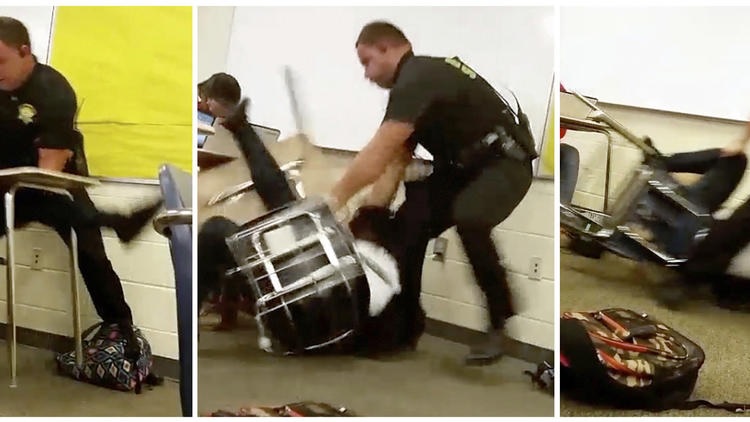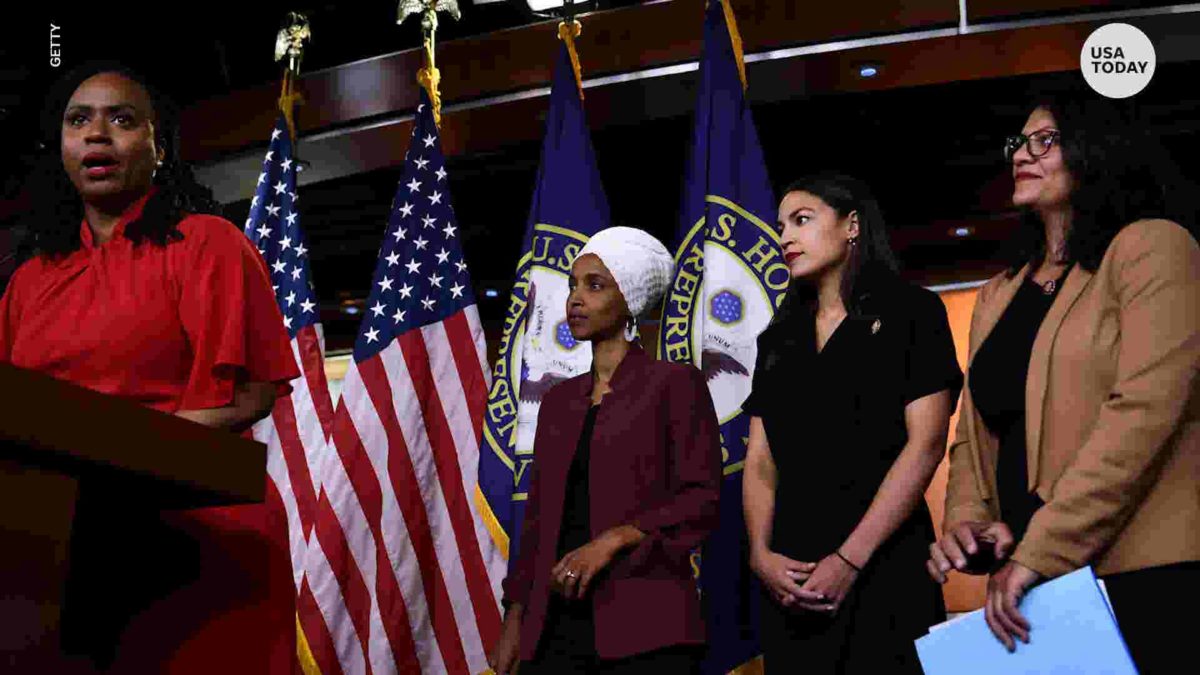
An unarmed 16-year-old schoolgirl who refuses to put away her cellphone does not deserve being grabbed by the neck and brutally slammed to the ground by a trained police officer. I repeat: an unarmed 16-year-old schoolgirl who refuses to put away her cellphone does not deserve being grabbed by the neck and brutally slammed to the ground by a trained police officer.
Last week, 16-year-old Shakara — a student at Spring Valley High School — was seen on cellphone video being thrown to the floor of her math classroom by South Carolina Sheriff’s Deputy Ben Fields. Cellphone video shows that Shakara was seated at her desk and making no sudden moves immediately prior to the violent assault where Fields grabbed Shakara from behind by her neck, and flipped her over so suddenly that the desk she was seated in overturned with her, and then bodily drags her out of the tangle of plastic and metal to lie prone on the classroom floor (video embedded after the jump). Already, social justice activists have rightfully identified the incident as yet another example of excessive police force targeting a Black body for unnecessary and unprovoked violence.
Already, too, however, a chorus of naysayers have also chimed in. “Hold up,” they say, “we haven’t seen the ‘rest’ of the video.”
“We don’t know,” they say, “what Shakara did to provoke the attack.”
There is nothing a seated, unarmed, and non-violent teenager could do that would justify this kind of brutal assault.
Police are given a broad arsenal of physical combat skills. Like any martial artist, they should have the capacity to select several alternative strategies for quelling a conflict that does not require them to violently bodyslam an uncooperative, if non-violent, person on the back of their head — the type of move that has an unnecessarily high risk of leaving the victim with spinal cord or brain injury. Police officers are supposed to be trained in situational deescalation, and proportional responses. Why are we holding these trained and skilled martial artists to lower standards of appropriate behaviour than untrained civilians, and specifically teenagers?
By almost all accounts, Shakara drew the attention of the Sheriff’s Deputy because she did not put away her cellphone fast enough to satisfy her math teacher. That may or may not be the case. It doesn’t matter.
An unarmed 16-year-old schoolgirl who refuses to put away her cellphone does not deserve being grabbed by the neck and brutally slammed to the ground by a trained police officer.
Being at a private pool party is not grounds for being bodyslammed by police. Jaywalking is not grounds for being tackled and bodyslammed by police. Not speaking English is not grounds for being bodyslammed by police. Skateboarding is not grounds for being bodyslammed and pepper-sprayed by police. Being Muslim is not grounds for being bodyslammed by police. Selling cigarettes is not grounds for being choked to death by police. Playing with a toy gun is not grounds for being shot and killed by police.
“Shoplifting” is not grounds for being shot and killed by police. Running away is not grounds for being shot and killed by police. Taking the stairs is not grounds for being shot and killed by police.
Failure to be a sufficiently obedient and deferential person of colour can not and should not be justification for violence and murder at the hands of police.
This isn’t a question of provocation; this is a question of disproportionate law enforcement responses to largely non-violent acts of civil disobedience. We cannot ignore how police violence is broadly tolerated when committed against the bodies of people of colour, and most commonly against the Black body. This mindset perpetuates an insitutional form of racial control, wherein law enforcement exists to quell acts of civil disobedience committed by people of colour with corporal punishment.
Violent White disobedience receives Rightwing flattery as “courageous” and “brave” against totalitarian government control. At the exact same time, society nods in approval as police violently put people of colour “back in our place” for routine acts of disobedience; for being too “uppity”; for “asking for it”.
The presumption that a Black (or Brown, or Yellow) person of colour deserved police assault is grounded in the assumption that people of colour deserve to be slammed to the ground for failing to “hop to” fast enough for authority. It infantalizes people of colour by applying kindergarten schoolteacher logic — a spanking for bad behaviour — against groups of non-White teenagers and adults. It applies a presumption of violent criminality and danger surrounding unarmed civilians (and often teenagers) of colour for acts of routine disobedience we tolerate (or even exalt) in the typical White youth or adult person. It assumes that some insight of rationale for the violence committed against her would be found if only we had five extra minutes of cellphone video; as if when Shakara refused to put away her cellphone, she expressed that disobedience by pulling out an Uzi and waving it wildly about the classroom and screaming death threats and anti-American obscenities, before she then sat down, put weapon away and started on her phone as we see at the start of the video (trust me: she didn’t do any of this).
Meanwhile, we’re not having the far more necessary conversation. We’re not asking why we place police and metal detectors disproportionately in schools and classrooms predominantly attended by (most often, Black) students of colour, and how this creates a school-to-prison pipeline that materially disadvantages Black youth and the rest of the Black community. We’re not talking about what it communicates to Black teenagers about their own self-image when police are stationed in their classrooms; and that these police act not as if they are there to protect students, but because we somehow think society needs to be protected from these students. How can we possibly believe that when we do this, schools should still be considered “places of learning” — and not places of hostility and violence — by Black students?
Shakara refused to put her cellphone away. A proportionate response — one we would expect in a predominantly non-Black school — might have been detention, a one-on-one meeting between student and teacher, or a parent-teacher conference. Only for (often, Black) people of colour do we buy into the totally incomprehensible thinking that a proportionate response for refusing to comply to a teacher’s request is calling the cops to commit an act of violence against a seated and unarmed 16-year-old girl.
The search for victim-blaming preamble to acts of police brutality is absurd, and we need to start calling this inevitable naysaying out for the alarmingly racist red herring it is.

